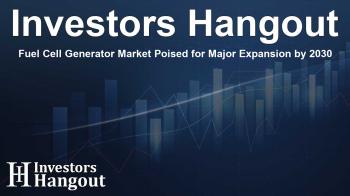Fuel Cell Generator Market Poised for Major Expansion by 2030

Fuel Cell Generator Market Growth Overview
The global Fuel Cell Generator Market is experiencing significant momentum, projected to reach a remarkable USD 1.80 billion by 2030. This expansion comes from an estimated value of USD 0.63 billion in 2025, marking a robust compound annual growth rate (CAGR) of 23.3% throughout the analysis period. The rise in adoption is largely attributed to the demand for silent, low-maintenance energy solutions in environments where noise and reliability are crucial, such as residential complexes and hospitals.
Diverse Applications Drive Adoption
Fuel cell generators excel in various applications, especially in hybrid renewable energy systems. Combining solar, wind, and fuel cells, these systems ensure a steady power supply. Their performance under extreme weather conditions also makes them highly suitable for defense operations and remote locations. An increasing emphasis on energy decentralization and the advantages offered by carbon credits further incentivize market growth.
Innovative Fuel Types Gaining Popularity
Ammonia Fuel Segment Insights
Among various fuel types, ammonia is swiftly gaining ground, expected to exhibit the highest CAGR in the upcoming years. With its high hydrogen content, ammonia emerges as an appealing carbon-free energy carrier that is easier to store and transport compared to traditional hydrogen. Ammonia's ability to liquefy at moderate pressures makes it a cost-effective solution for infrastructure development, coupled with ongoing research that enhances its feasibility in commercial power generation.
Market Trends in Generator Size
Large-Scale Generator Adoption
Large-scale fuel cell generators, particularly those exceeding 200 kW, are projected to see heightened growth. These systems are increasingly utilized in industrial, commercial, and utility-scale applications. While they carry higher initial costs, their ability to supply high-capacity, low-emission power is increasingly attractive for data centers and microgrids. Additionally, their functionality as grid-tied or off-grid solutions positions them as vital players in both backup systems and peak-load management.
Regional Insights on Market Growth
Europe stands out as the fastest-growing region within the Fuel Cell Generator Market. The region’s ambitious climate policies and funding efforts, particularly under initiatives like the European Green Deal, are catalyzing investment in clean technologies. Nations such as Germany, France, and the Netherlands are leading in hydrogen infrastructure development, directly influencing fuel cell technology's widespread adoption. The growing focus on reducing fossil fuel dependence also boosts the demand for sustainable energy solutions across various sectors.
Key Players in the Fuel Cell Generator Market
The Fuel Cell Generator Market features a competitive landscape, including key players such as Bloom Energy, PowerCell Sweden AB, Nedstack Fuel Cell Technology, and Ballard Power Systems. These companies employ strategies such as acquisitions, product launches, and partnerships to capture market share. Their innovation and commitment to developing advanced fuel cell solutions are vital for market progression.
Bloom Energy: A Leading Innovator
Bloom Energy is recognized as a frontrunner in the production of fuel cell systems. The company offers a diverse portfolio, including electrolyzers and carbon capture technologies. Their fuel cell generators, branded as Energy Servers, represent the cutting edge of thermal electric generation technology. With operations spanning North America and Asia Pacific, Bloom Energy's manufacturing facilities cater to a global clientele.
PowerCell Sweden AB: Advancing Hydrogen Technology
PowerCell Sweden AB, emerging from the Volvo Group, specializes in hydrogen and electric technologies. Through its product brand PowerCellution, the company is dedicated to developing high-power density fuel cell systems that serve various applications, including stationary and automotive sectors. Their commitment to research and development underpins their technology advancement and market competitiveness.
Frequently Asked Questions
What is the projected growth of the fuel cell generator market?
The Fuel Cell Generator Market is poised to grow from USD 0.63 billion in 2025 to USD 1.80 billion by 2030.
What are the main drivers behind the market's expansion?
Key drivers include the demand for low-maintenance power systems, hybrid energy solutions, and incentives for sustainable energy.
Why is ammonia considered an important fuel type?
Ammonia is recognized for its high hydrogen content and ease of storage compared to hydrogen, making it a beneficial carbon-free carrier.
Which segments of the market are expected to grow the fastest?
Large-scale generators exceeding 200 kW and the ammonia fuel segment are forecasted to experience the highest growth rates.
Which regions are leading in fuel cell adoption?
Europe is leading, driven by strong climate policies and hefty investments in hydrogen technology.
About The Author
Contact Olivia Taylor privately here. Or send an email with ATTN: Olivia Taylor as the subject to contact@investorshangout.com.
About Investors Hangout
Investors Hangout is a leading online stock forum for financial discussion and learning, offering a wide range of free tools and resources. It draws in traders of all levels, who exchange market knowledge, investigate trading tactics, and keep an eye on industry developments in real time. Featuring financial articles, stock message boards, quotes, charts, company profiles, and live news updates. Through cooperative learning and a wealth of informational resources, it helps users from novices creating their first portfolios to experts honing their techniques. Join Investors Hangout today: https://investorshangout.com/
The content of this article is based on factual, publicly available information and does not represent legal, financial, or investment advice. Investors Hangout does not offer financial advice, and the author is not a licensed financial advisor. Consult a qualified advisor before making any financial or investment decisions based on this article. This article should not be considered advice to purchase, sell, or hold any securities or other investments. If any of the material provided here is inaccurate, please contact us for corrections.

